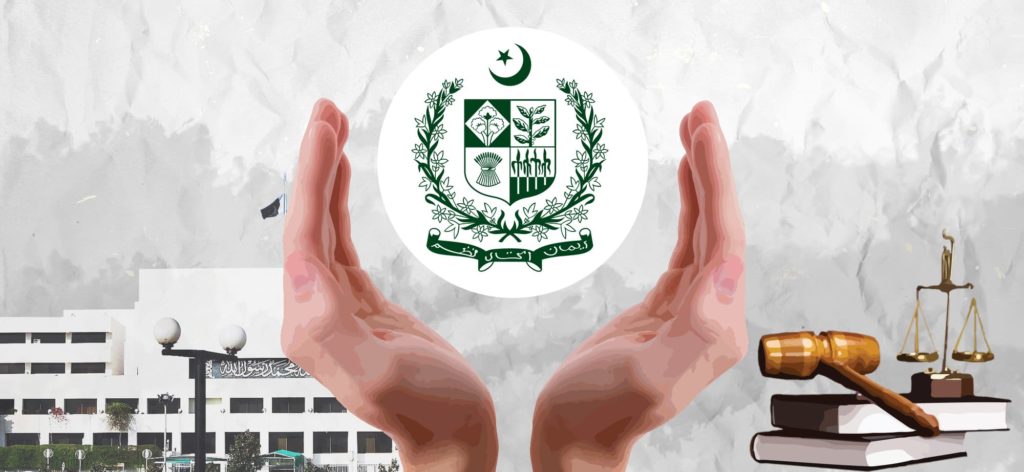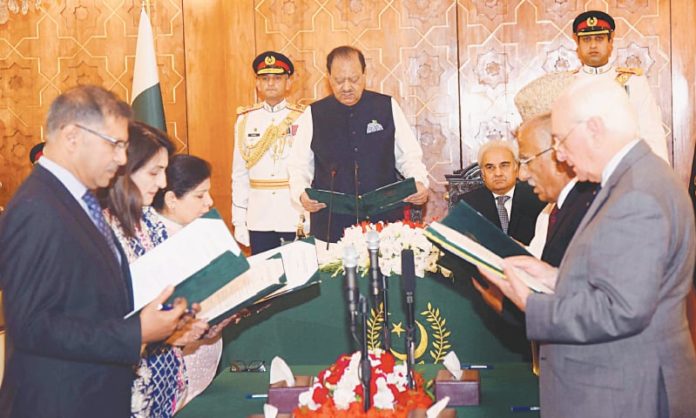Dear Readers,
With elections barely two months away, a Caretaker govt was installed on June 1, its purpose is to create a conducive environment for genuine elections and to ensure the neutrality of the govt to facilitate a smooth transfer of power from one elected govt to another. As a non-partisan administration, the caretaker’s primary role is to exercise the routine functions of govt but it comes in at a time when Pakistan facing a severe crisis of governance. When the essential pillars of good governance, including rule of law, accountability and transparency are trampled by corrupt incompetent rulers, corruption, low human development and higher poverty levels will flourish. In the absence of sound internal contorts and institutionalized accountability, many govt departments Have turned into dens of corruption. Despite being a democratic country there is a lack of accountability in Pakistan that has given rise to serious problems. The country is being governed by c set of history corrupt bureaucrats, with honorable exceptions, with officers having absolutely no interest in helping people. Pakistan is also in the of an economic crisis. The legal procedure is so cumbersome that punishing the corrupt is almost impossible, political interference is another obstacle that hinders accountability. The interim setup faces a critical time before the new occupants come in, they face a challenge in maintaining a chaos-free political scene to ensure systems run smoothly and no significant policy changes are made to disrupt the process of free and fair elections. For the benefit of readers, I am reproducing my article titled “THE CARETAKER REGIME’.
Headed by former Chief Justice Nasirul Mulk, the Caretaker Regime taking office today includes in its mission statement (1) running the affairs of the govt according to the Constitution and (2) administrative and operational back-up to the Election Commission of Pakistan (ECP) for conducting of free and fair Parliamentary elections on July 25, 2018, or whenever they are held. One is hoping that the Caretaker Regime must not only be neutral and impartial manner but be seen to be so.
Those violating the Constitution, being blatantly corrupt and indulging in perjury and forgeries, etc. must be held accountable. At the very least they (and their close aide collaborators) must not be allowed to take part in the coming elections. Given the example of Ishaq Dar, declared elected as “Senator” even while absconding in London, this cannot be left to the ECP only. Supported by the Caretaker Regime, NAB must play its part. Democracy in Pakistan cannot afford the selective interpretation of the rule of law while ignoring the spirit of the law by its political leaders, aided and abetted by unscrupulous pubic officials. The first order of business is to remove forthwith those politicized bureaucrats actively contributing to the rapacious conduct of their political masters and instigating them to erode the norms of national security. Quoting my article of May 5, 1 995 titled, “Direct Vote and Democracy”, “other than bad advice our political leadership depends upon ‘special interest groups’ (and individuals) for survival once they are in office rather than on the electorate that voted them into office.’
The second order of business is to reverse some of the last-minute extraordinary decisions made by the outgoing government. For example, a three-month salary bonus that goes to federal employees. If this is not outright bribery meant to influence elections, then what is? As much as I personally like Ali Jahangir Siddiqui, sending him out to be our Ambassador to the US, given his legal circumstances and the likely short duration of his tenure, is way out of line. Consider the recent attempted strike by DMG officers in Punjab protesting NAB’s arrest of the efficient but ethically questionable Ahad Cheema, whose SUV was found parked in a vehicle showroom with Rs.14.5 million hidden in cash. What has been done to the principal actors behind the ‘pen-down’ strike threatening governance in Punjab? The administrative breakdown could have led to anarchy and degenerate into an internecine civil war, quite like Libya or Yemen. Should these bureaucrats be left in place to manipulate the elections so that the ‘businesses of the next ‘elected’ government can go on as usual? Accountability is the touchstone of democracy. As such, too much is at stake to quibble about purely legal ramifications. Even with prima facie evidence, the persons involved must be suspended till they are cleared of wrongdoing.
Joining our elected representatives, an increasingly corrupt media takes vicarious pleasure in subjecting the superior judiciary and armed forces to muckraking. The moral authority of the government having been virtually destroyed; the credibility of democracy is in tatters. National security does not comprise guarding our territorial boundaries against external aggression and or fighting internal strife only what about the massive erosion of societal security an obnoxious and shameful harangue has poured contempt on the rule of law and targeted the respected superior judiciary who have to interpret it. Such gross disrespect by Mian Nawaz Sharif and his aides seeks to end the rule of law. In baiting the Armed Forces why are they adopting a deliberate policy of confrontation? While Maryam Nawaz Goebbels-like keeps on repeating her lies about the forgery exposed by the ‘Calibri Font’, she perhaps has now begun to believe it. The confrontational stance that she and her father have adopted publicly is alarming, “those whom the gods want to destroy, they first make mad”.
The caretaker regime needs to support NAB. Too much is at stake for the poor people of this country for them to act legally squeamish in trying to recover ill-gotten wealth, besides everything money-laundering goes into the financing of murder and terror through organised crime. Having suffered in some great measure over the past two decades nearly, there is mass anxiety and apprehension that unless the fabulous wealth acquired by these criminals is traced out and recovered, it will facilitate their return to the corridors of power is a certainty. However in attempting to bring to justice those who have violated the due process of law at will, should we also ourselves short-circuit the due process of law? Going the wrong route, and that also when in haste to correct a wrong, will only compound the situation.

With the elections to be held 60 days hence on July 25, 2018, consider the suggestion made nearly a quarter century ago in my article, “The 90 Plus 90 Formula” of December 5, 1996. “This would really mean that the Assemblies not being called into session for another 90 days in order that the accountability process for at least a majority of the elected representatives is complete. Either the President can make a reference to the Supreme Court (SC) for adjudicating a time frame of 90 days post-election or the caretaker government can approach the court for relief, with the proviso that ordinances enacted by the President during this period will not lapse for 30 days after the Assemblies come into session. There is a temptation to give more than 90 days for accountability, but it must be for a very limited period so that the caretakers do not get too used to this. The headiness of being in power has its own dynamics evoking latent ambition. Luckily for us, the broad mass of the people want elections and accountability, both within a limited time frame,” unquote.
The accountability process being necessarily a long drawn out affair, and with the treasury looted and the country beggared, the intelligentsia is riven with debate as to whether elections or accountability should come first. However there is nothing more important for this country than to revive the democratic process as given in the Constitution. While the time and space can be adjusted because of the extraordinary circumstances, the electoral process has to take precedence in order to ensure the credibility of constitutional authority and continuity thereof.
“The opinions/views expressed in Defence Journal are entirely those of the writers and cannot be construed to reflect the official views of Defence Journal”.




